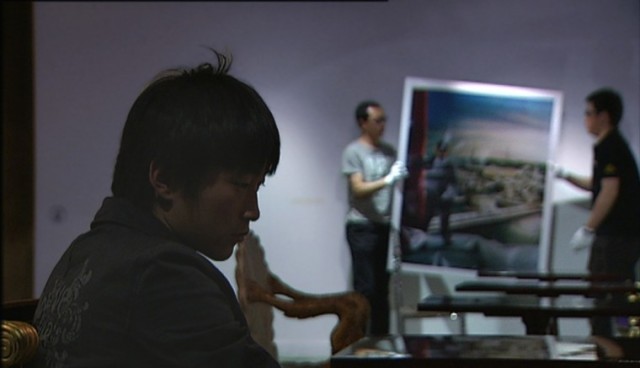 LIU GANG DURING INSTALLATION OF HIS WORK IN CHIMERASA complicated beast: two post-Mao contemporary Chinese artists from different generations
LIU GANG DURING INSTALLATION OF HIS WORK IN CHIMERASA complicated beast: two post-Mao contemporary Chinese artists from different generationsWang Guangyi, puffing on big cigars, his goatee and long hair wagging, is a formidable opponent spouting angry denunciations of westernized academics in Chinese art discussions -- his clout not lessened by his being perhaps the richest artist in China. But his work, which has blended burnished Mark Kostabi-like manikin figures with Dali knockoffs and a multiplicity of images blending US pop brands with social realist poster art and revolutionary slogans (Coca Cola and Mao and "No"), important as he may be justified in saying he was as a mover and shaker of China's first wave of contemporary art, big money-maker though he is now, seems a little dated, a little Eighties, and certainly less newsworthy compared to the brave and provocative Ai Weiwei. Wang himself admits to feeling disappointed. Young Liu Gang on the other hand, cherubic and cute as a button, is still hungry, even greedy ("ten thousand is as low as I'll go"). Quietly busy and driven, clicking away with his tripod and his expensive digital camera and playing with subtle pastel images of crinkled ads ("Paper Dreams" his first big show, exhibited worldwide, was called), seems more truly contemporary and interesting. His work captures the kind of confused globalized identity mish-mash the great Jia Zhang-ke talked about in his 2004 film,
The World. Liu too roams vast expensive Chinese mockups of European cultural treasures. Wang sought to fight oppressive Chinese political forces; Liu only comments obliquely on culture. Now he's wrestling, in his musings anyway, with the issues Liu depicts of Chinese East-West cultural schizophrenia.
The old and young artists' styles are very different: Wang's is declarative and coonfrontational; Liu's in contemplative and indirect. But both have the same complex: international contemporary art is a Western thing, its hunger for exotic artists a source of their success, and this has unintentionally led both of them, whether several decades ago or only recently, to see the world through Western lenses. Liu is most overtly troubled by this, because it's what he has been criticizing and delineating in his own work.
Mika Matilla, who is Finnish but lives in Beijing, is ingenious in the way he makes the two artists strong contrasts, and at the same time a single voice of Chinese contemporary art's uneasy relationship to the West. In the end the message is rather simple and contains no revelations. But this is, already by this point, a beautiful and elegant film.
In his last third, entitled "Marriage," Matilla drifts a bit to one side. We see Liu wants to get married, but his parents object, wanting him to focus on career, all the pressure on hiim because he's of the "only child generation." Matilla keeps showing Wang pacing around impressive shows of his work, but then when Liu goes ahead and gets married, we realize we don't know a lot about the private lives of either artist. Though we repeatedly see him with his parents, Liu is private and noncommittal: how did he even meet this young woman? Wang on the other hand is very public: but has he a family or a home life? Anyway, Liu's art career seems temporarily derailed by his marriage. What a cute couple! He takes a regular job in Beijing with the Dutch cultural agency SICA, and the film ends with many handsome photos of him posing with his pretty wife. His first series exhibition was "Paper Dreams," his second "Better Life," his third, to be called "Only Child Generation," still remains uncompleted. Are Wang and Liu both chimeras, illusions, odd mixes of two unrelated beasts? Matilla's handsome film is more food for thought than an answer. With the very rich at the top of China's heap, art is a big investment game -- that aspect a topic only touched upon here.
Chimeras, 88 mins., debuted at the Toronto Hot Docs festival April 25, 2013 and was also included in the San Francisco International Film Festival, where it was screened for this review. Matilla is a cinematographer on documentaries who has lived in Beijing for years. He has another film in the works.





